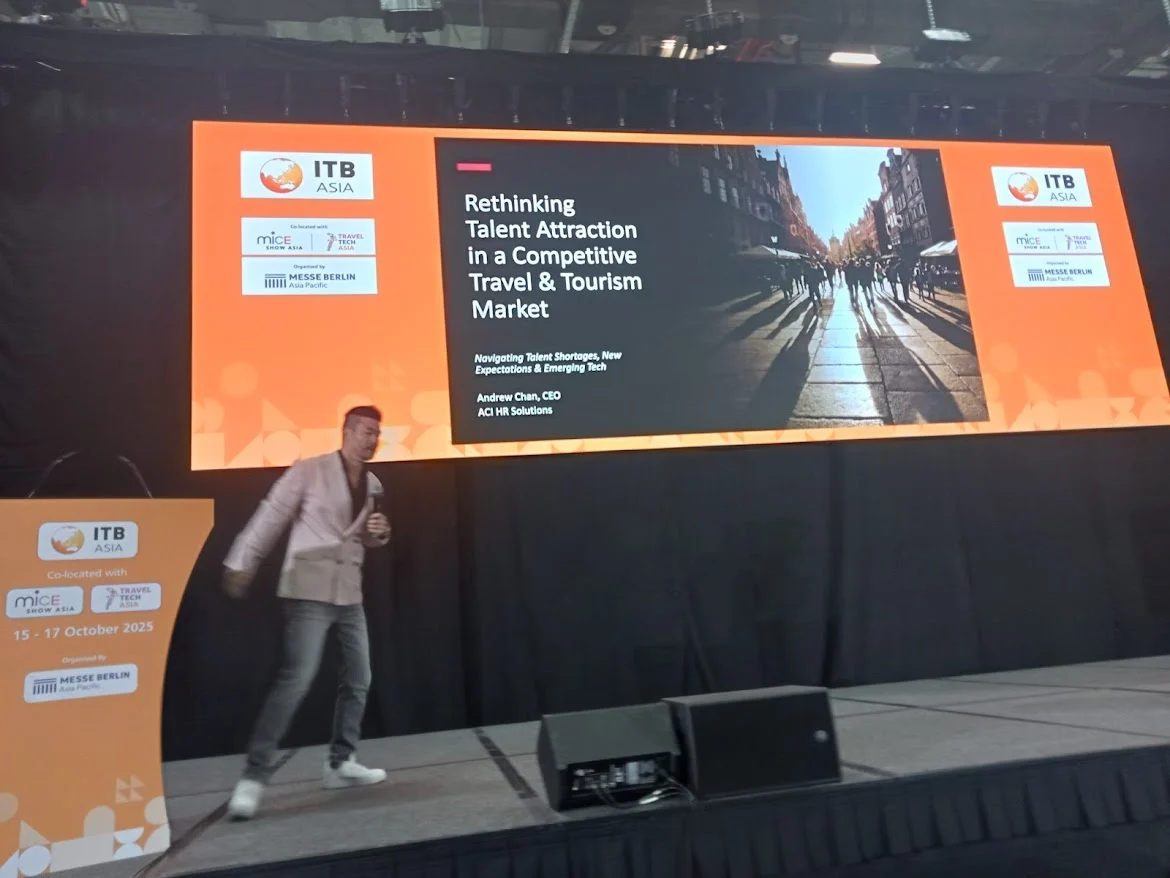
Chan Discusses Ongoing Talent Shortage in Global Travel and Tourism Sector
The CEO of ACI HR Solutions highlights the persistent issue of talent shortages impacting the travel and tourism industry during his speech at ITB Asia 2025.
Three years after the world reopened post-pandemic, the global travel and tourism sector is still experiencing a shortfall in terms of human resources.
ACI HR Solutions CEO Andrew Chan pointed this out to attendees during his talk on Rethinking Talent Attraction in a Competitive Travel & Tourism Market at ITB Asia 2025 on October 17th.
Chan emphasized the ongoing challenge of hiring within travel, tourism, hospitality, and aviation, noting a continuing talent shortage despite the industry swiftly rebounding since 2022.
He stated: “I don’t like to talk about COVID because I believe that’s years behind us, but it certainly affected the labor market. While the industry has strongly rebounded, a severe talent shortage persists. If anyone has made some hires recently or is in the process of hiring, you’re likely facing challenges because the industry lost about 70 percent of its staff during the pandemic.”
Indeed, it has been reported that nearly three-quarters of the global travel and tourism workforce left the industry to seek better employment opportunities.
Despite the reopening of travel routes, not all former employees have returned, creating significant gaps in the global talent pool.
Currently, competition to secure the best available talent has increased worldwide, with hiring managers and HR departments scrutinizing potential candidates’ skill sets closely, frequently overlooking their country of origin.
A Significant Shortfall
While the sector has seen robust recovery in the Asia-Pacific region, staffing levels within the hospitality sector remain 20 percent lower than pre-2020 figures. European airlines have had to cancel numerous flights due to insufficient staffing to maintain regular routes. Similarly, many restaurants in North America and Australia have cut back on hours because they cannot find workers.
Chan revealed that 80 percent of employers are currently reporting talent shortages in the industry, and turnover in hospitality is two to three times the global average.
One reason for this shortage is the generational shift in employment expectations. Gen Z job seekers, in particular, seek flexibility and purpose in their work beyond just a paycheck.
Chan explained: “65 percent of Gen Zers prioritize flexibility over salary. They also desire inclusivity and wish to work for organizations focused on sustainability. Their career development should ensure their well-being; therefore, they prefer employers who align with their lifestyle.”
How Companies Are Adapting
Highlighting Marriott’s Serve 360 and Accor’s Work Your Way programs, Chan emphasized their approaches to retain talent.
He pointed out: “Marriott launched Serve 360, focusing heavily on employee involvement while promoting sustainability. In contrast, Accor developed Work Your Way during COVID, allowing employees to choose their working hours and conditions. This initiative has gradually become part of their corporate culture.”
Yet, it seems that all sectors, including technology, healthcare, and retail, are competing for the same limited pool of talent, targeting candidates with essential skills applicable across travel and tourism.
Technology’s Role
Chan concluded by stressing the growing importance of technology, particularly artificial intelligence (AI) and digital transformation in the workplace.
He commented humorously: “It seems impossible to attend a conference without hearing about AI. There is tremendous demand for digital fluency, data literacy, and AI skills. Recruitment and HR are leveraging AI and analytics during hiring.”
Hospitality firms like Hilton use chatbots and AI for candidate evaluations, while airlines have started employing virtual reality tools for cabin crew training, aiming to reduce costs and enhance efficiency.
“Embracing technological advancements is crucial for our industry. Consider how to utilize or optimize technology as you hire and evolve into a talent magnet for your industry and brand,” he advised.
The Importance of Brand Building
Chan emphasized that effectively showcasing a brand and narrating a compelling story that appeals to today’s job seekers could revolutionize hiring processes throughout the sector.
He urged employers: “If you’re in the hiring process, strategize on how to promote your brand; highlight your culture, advantages, and travel opportunities. Being part of the travel industry, you have unique aspects to emphasize.”
Furthermore, he reiterated that employment is no longer solely about salary.
He stated: “Sustainability and flexibility are what truly matter to Gen Z job seekers. Therefore, consider your offerings during your next recruitment campaign.”
